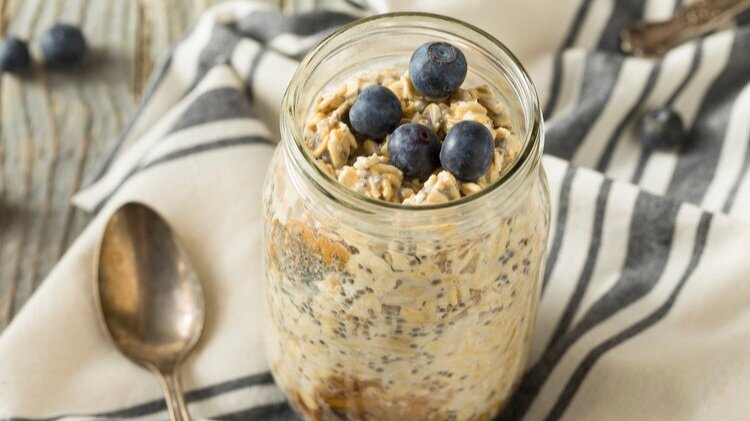
The most important thing to keep in mind with postpartum nutrition needs is that you need to eat, says Karges. “One of the biggest pitfalls I see for new moms is the tendency to engage in restrictive or restrained eating behaviors while postpartum and/or breastfeeding,” she says. This isn’t the time to follow rigid diet rules under pressure to lose weight after pregnancy—which “can translate to restrictive eating during one of the most nutrient-demanding periods of a new mom’s life,” according to Karges—nor is it the time to sacrifice taking care of yourself (i.e. going long stretches without eating) while you take care of your baby. Undereating during the postpartum period can lead to malnutrition, a prolonged healing process, reduced milk supply, and poor mental health.
If you need reminders—and, let’s be honest, you most certainly will in the fog of new parenthood—set an alarm on your phone that reminds you to eat something every few hours. You can also “keep fluids and snacks around the areas you tend to sit with your baby as reminders to eat and feed yourself, too,” says Karges.
Best foods for breastfeeding
For those who are breastfeeding or pumping, postpartum nutrient needs are even higher. Producing your a food source that can sustain and grow another human using just your body requires calories—a lot of them—as well as extra protein and micronutrients.
“Generally, a mother’s body will prioritize nutrient needs to the baby,” says Karges. During lactation, that means the body funnels resources to the production of breastmilk, even if it depletes the stores that keep you healthy, she explains.
“Depleted nutrient stores can be a contributing factor to physical and mental health complications postpartum, which is why it’s crucial to prioritize adequate nutrition in the months after birth and while lactating,” Karges says. This is why you should beware of strict breastfeeding diets that promote elimination or restriction. “They can be harmful to a new mother, especially if it severely limits her overall intake and restricts nutrient-dense foods that could otherwise support her increased nutrient needs.”
If you are breastfeeding, Manaker also recommends prioritizing several micronutrients including iodine, choline, vitamin C, and vitamin A. (Many of which you can find in postpartum supplements.)
The Perfect Postpartum Meal
Both experts we spoke to stressed that there’s no such thing as the perfect postpartum meal. “As a mom of five myself, I understand the challenges that can come with keeping yourself fed when you’re also caring for your baby,” says Karges. “It’s about doing the best you can with what you have. Your plate doesn’t have to look perfect in order to offer you the nutrition your body needs.”
Aim to have foods within reach that require little to no prep work. “Hard boiled eggs, low-sugar protein bars, Greek yogurt cups, and hummus cups with carrots are all easy to eat with one hand, take zero prep time, and are loaded with nutrients,” says Manaker.
This is also the time to outsource where you are financially able and lean on the support of loved ones who can help prepare freezer meals or snacks. “Delegating and/or automating whenever possible can help you stay nourished during the postpartum season—order groceries online and have them delivered, use a meal delivery service temporarily, or utilize kitchen tools that can simplify cooking, such as a slow cooker or instant pot,” Karges says. Also wise? Stock your pantry and fridge with one-handed foods like trail mix, fresh fruit, almond or peanut butter pouches, and veggies you can dip into a store-bought tub of hummus or guacamole.
7 Easy Postpartum Meal Ideas
Make these postpartum meals yourself or send this wishlist to a support person who’s offered to help meal prep or stock your freezer for you.
Blueberry almond overnight oats
Courtesy of Crystal Karges



